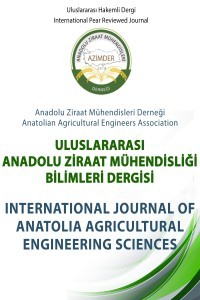Türkiye’de ve Dünyada Yağlı Tohum ve Ham Yağ Üretim Durumu Türkiye Yağlı Tohum Üretimine İlişkin Önemli Sorunlar
Yağlı tohumlar yağ, yem, kimya ve enerji sektörünün en önemli hammadde kaynağını oluşturmaktadır. Tohumlarında içerdiği yağ, protein, karbonhidrat, mineral maddeler ve vitaminler nedeniyle insan ve hayvan beslenmesinde, biyodizel üretimi için ise enerji sektöründe oldukça önemli bir yere sahiptir. Dünyada yaygın olarak tohumlarından yağ elde edilen bitkilerin başında soya, ayçiçeği, pamuk (çiğit), kolza, yerfıstığı, susam, aspir, hintyağı, haşhaş, keten, kenevir, jojoba, mısır (mısır özü), zeytin, palm (meyve ve çekirdek) ve Hindistancevizi gelmektedir. Ülkemizde ise ayçiçeği, çiğit, soya, yerfıstığı, haşhaş, susam, aspir, kolza, mısır ve zeytin bitkisel yağ elde edilen önemli ürünleri oluşturmaktadır. Bu ürünler içerisinde zeytin ve yağ bitkisi olmayanmısır ve pamuk tohumu (çiğit) ülke bitkisel yağ sanayisine önemli katkı sağlaması bakımından yer almıştır. Yağlı tohumlar ve bitkisel yağlar dünya ticaretinde önemli bir yere sahiptir. Dünyada toplam parasal değeri yaklaşık 320 milyar dolar olan 185-190 milyar ton yağlı tohumve 85-90 milyon ton bitkisel yağ, ticarete konu olmaktadır.2017 yılı verilerine göre dünya yağlı tohum üretimi 575 milyon ton, ham yağ üretimi ise 194 milyon ton olarak gerçekleşmiştir. Aynı dönemde Türkiye’de yağlı tohum üretimi 3.8 milyon ton, yerli tohumdan ham yağ üretimi ise 850 bin ton olmuştur. Yağlı tohum ve ham yağ üretiminin yeterli olmaması, yurt dışından yağlı tohum, ham yağ ve yağlı tohum küspesi ithalatını artırmaktadır. Son üç yıllık (2015-2017) ortalamalara göre Türkiye yağlı tohum, ham yağ ve küspe ithalatı karşılığında3.5 milyar dolar ödeme yapmıştır. Ülkemizin mevcut nüfusu (82.3 milyon) ve nüfus artış hızı (%1.5) dikkate alınarak geleceğe yönelik gıda ve sanayi amaçlı bitkisel yağ kullanım ihtiyacımız göz önünde bulundurulduğunda yağlı tohum üretiminin ne denli önemli olduğu ortadadır. Bu nedenle, bitkisel yağlı tohum üretim planlamasının yapılması ve ülkemizde var olan üretim potansiyelinin iyi değerlendirilmesi, ayrıca üretime yönelik mevcut sorunların çözülmesi önem arz etmektedir. Yağlı tohum üretimimiz genel anlamda politik sorunlarla, özel anlamda ürün çeşidine ve yetiştirildiği bölgenin iklim ve toprak koşullarına bağlı sorunlarla karşı karşıyadır. Politik sorunlar üretim miktarı, ürün fiyatı, destek ve teşvikler arasındaki dengenin iyi kurulmasıyla, özel sorunların ise yüksek verim ve yağ oranına sahip çeşit ıslahı ve yetiştirme tekniğine yönelik iyileştirme çalışmalarının desteklenmesiyle çözülebilir.
Oil Seeds and Crude Oil Production in the World and Turkey, Problems of Oilseeds Production in Turkey
Oilseeds are the most important raw material source of the oil, feed, chemical and energy sectors. Due to the oil, protein, carbohydrate, mineral substances and vitamins it contains in its seeds, it has an important role in human and animal nutrition and in the energy sector for biodiesel production. Soybean, sunflower, cottonseed, rapeseed, peanut, sesame, safflower, castor oil, poppy, flax, hemp, jojoba, corn, olive, palm and coconut are the most widely used oilseeds in the world. In our country, sunflower, cottonseed, soybean, peanut, poppy, sesame, safflower, rapeseed, corn and olive are the important products obtained from vegetable oil. Among these products, olive, corn and cottonseed which are not oil plants, are important in terms of contributing to the country’s vegetable oil industry. Oil seeds and vegetable oils have an important role in world trade. 185-190 billion tons of oilseeds and 85-90 million tons of vegetable oil, whose total financial value is approximately 320 billion dollars, are subject to trade in the world. According to 2017 data, world oil seed production was 575 milliontons and crude oil production was 194 million tons. In the same period, 3.8 million tons of oilseed production in Turkey, while crude oil production was 850 thousand tons of seeds from native. Inadequate production of oilseed and crude oil increases the import of oilseed, crude oil and oilseed meal from abroad. The last three years (2015-2017) according to the average oilseeds Turkey, in return for crude oil and oil cake imports has paid 3.5 billion dollars. Considering our country's current population (82.3 million) and population growth rate (1.5%), the importance of oilseed production is obvious when considering the need for future vegetable and vegetable oil use. For this reason, it is important to plan the production of vegetable oil seed and to evaluate the existing production potential inour country and to solve the existing production problems. Our oilseed production is faced with political problems in general, specific problems related to the product type and climate and soil conditions of the region where it is grown. Political problems can be solved by establishing a good balance between production quantity, product price, support and incentives, and special problems can be solved by supporting the improvement studies for the breeding and cultivation technique with high yield and oil content.
___
- Anonim, 2014. FoodandAgricultureOrganization of the United Nations (FAO) İstatistik Bölümü İnternet Sitesi (http://www.fao.org), (Erişim: Kasım 2019).
- Anonim, 2015. FoodandAgricultureOrganization of the United Nations (FAO) İstatistik Bölümü İnternet Sitesi (http://www.fao.org), (Erişim: Kasım 2019).
- Anonim, 2016. Türkiye İstatistik Kurumu (TUİK) Verileri İnternet Sitesi (http://www.tuik.gov.tr/), (Erişim: Kasım 2019).
- Anonim, 2017. FoodandAgricultureOrganization of the United Nations (FAO) İstatistik Bölümü İnternet Sitesi (http://www.fao.org), (Erişim: Kasım 2019).
- Anonim, 2019. Karma Yem Sanayi Raporu. Türkiye Yem Sanayicileri Birliği (TÜKİYEMBİR), Poyraz Ofset Matbaacılık Matbaacılar Sitesi 1534, No: 9, 65 sayfa, Ankara.
- Arıoğlu, H., 2016. Türkiye’de Yağlı Tohum ve Ham Yağ Üretimi, Sorunlar ve Çözüm Önerileri.Tarla Bitkileri Merkez Araştırma Enstitüsü Dergisi, 25 (Özel sayı-2):357-368.
- Ayaz, A., 2008. Yağlı Tohumların Beslenmemizdeki Yeri. Sağlık Bakanlığı Yayın No: 727, Klasmat Matbaacılık Matbaacılar Sanayi Sitesi 559, No: 26, Ankara.
- Karakuş, M.Ü., 2014. 12. Uluslararası Yem Kongresi Açılış Konuşması. TürkiyeYem Sanayicileri Birliği Dergisi, Sayı:70, Sayfa: 29-40, Ankara.
- Onat, B., Arıoğlu, H., Güllüoğlu, L., Kurt, C., Bakal, H., 2017.Dünya ve Türkiye’de Yağlı Tohum ve Ham Yağ Üretimine Bir Bakış. KSÜ Doğa Bilimleri Dergisi, 20: 149-153.
